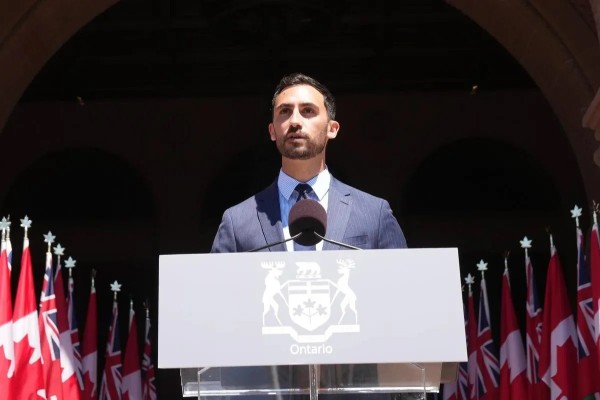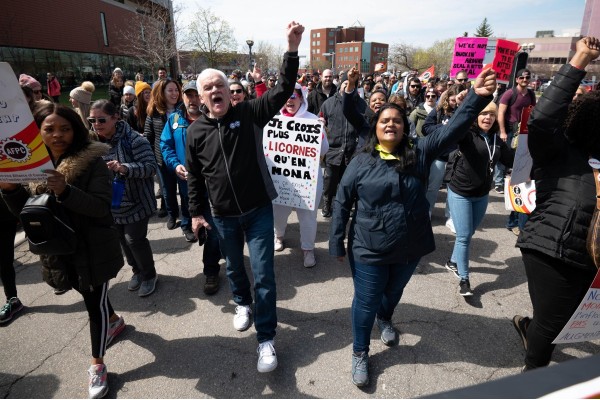Why social workers should support the CUPE 3912 labour strike
The labour dispute is a reflection of the inequitable distribution of resources within a two-tiered academic system

CUPE 3912 members picketing outside Dalhousie University. Photo courtesy CUPE 3912.
Take a short walk through the Dalhousie University campus and you will see rows of picket lines at the university’s main teaching buildings. CUPE 3912 members, comprised of teaching assistants, markers, demonstrators, and part-time sessional instructors started their legal strike at 12:01 am on Wednesday, October 19, 2022.
The labour dispute is over wages. Wages that did not increase since 2019, despite administrative salaries raising on a yearly basis. The salary increase for administrators and senior staff at Dalhousie has been estimated to average close to eight percent for 2021-2022 with Dalhousie’s President, Deep Saini, leading with a 13 percent increase.
And, while at the end of 2021, the Consumer Price Index (CPI), the most well-known indicator of inflation, surpassed five percent nationally, CPI reached eight percent in August and was recently sitting at 6.9 percent at the end of September. These are high numbers to stomach when your wage remains flat.
Wage parity is not merely an internal matter. Dalhousie prides itself on being part of the U15 network of research-intensive Canadian universities, a group that fosters the development and delivery of research informed higher education. This is the type of research that trickles down in the classrooms and aims to train and mentor students in becoming the innovative leaders of tomorrow.
Yet, unlike its sister U15 institutions, Dalhousie does not pay its CUPE 3912 members similar dollar amounts. Teaching assistants at the University of Toronto earn $44 per hour, while teaching assistants at Dalhousie get just $24 per hour.
Dalhousie Teaching Assistants and Part Time Instructors have been in legal strike positions since March. This means that we could potentially be on strike during Fall Semester 2022. What do we want? #DalStrike pic.twitter.com/f0mThscx4D
— CUPE 3912 (@CUPE3912) August 31, 2022
While the cost of living is typically lower in Halifax than Toronto, this is no longer the case as the price of housing and food has risen. In fact, living costs in Nova Scotia have been climbing to record levels in 2022, with CPI in the province surpassing national averages, reaching 9.3 percent (rent costs also rose to 8.2 percent and food by 8.8 percent).
The city of Halifax in particular is experiencing an acute housing crisis punctuated by rent increases, renovictions, luxury condo development and a reduction in the existing stock of both affordable and social housing.
You do not even have to take Toronto, Canada’s richest city, as a comparative benchmark. Western University in London, Ontario and the University of Ottawa are both paying its teaching assistants close to double the amount remunerated by Dalhousie.
Social workers devote most of their professional careers to addressing issues of systemic inequalities. The wage disparity between instructors, teaching assistants and administrative staff, and between sessional staff from similar universities, reflect deep inequities. Supporting the strike is a clear call to action.
Labour organizing is part of social work curriculum
Community organizing is a staple credit course required in undergraduate and graduate level education at most schools of social work. Teaching community organizing is not merely about familiarizing social work students with the work of civil society and the non-profit sector or discussing large scale demonstrations, such as the Occupy Movement or the Black Lives Matters protests, but also about teaching students about unions, about strategies and tactics that could be used to strengthen union power and increase workers’ occupational conditions.
Community organizing is about teaching students how to best engage in advocating, mobilizing and organizing for dismantling the power structures in society that are keeping people in precarious economic conditions.
And while teaching regularly unfolds in the abstract realm, social work teaching cannot occur in a vacuum, as social work theory is of little use if not applied in practice. Praxis is what we aim for in social work, and teaching about community organizing and labour issues ultimately needs to be reflected in taking a supportive position in solidarity with those striking for better working conditions.
Crossing the picket line will bring to light a deep ideological contradiction between what we preach as social work educators and what we would be doing in practice.
Social justice, including economic justice, is a core value in social work
The pursuit of social justice is a core value of social work, as outlined in the Canadian Association of Social Workers Code of Ethics. Guided by principles of fair and equitable distribution of resources, “social workers uphold the right of people to have access to resources to meet basic human needs.” In practice, this often translates into striving to ameliorate the negative effects created in society through the primary distribution of resources via the private market.
The CUPE 3912 labour dispute is the fallout from an inequitable distribution of resources within a two-tiered academic system. It is also an indictment of a two-tiered university professoriate which employs highly paid permanent faculty members while failing to increase pay for precariously employed sessional and temporary assistants and instructors.
Social workers have an ethical obligation to stand in solidarity with CUPE 3912 workers.
Raluca Bejan, Assistant Professor
Jeff Karabanow, Professor
Cassandra Hanrahan, Associate Professor
Nancy Ross, Assistant Professor
Merlinda Weinberg, Professor
Terrence Lewis, Associate Professor
Marjorie Johnstone, Associate Professor
Michelle Sutherland-Allan, Assistant Professor
Gail Baikie, Assistant Professor
Janet Pothier, Instructor
Jack Wong, MSW Student
Nicole Slaunwhite, MSW Student
Catherine Bryan, Associate Professor
Eli Manning, Associate Professor
Catrina Brown, Professor
Amanda Wilneff, MSW Student
Maggie Hertzberg, MSW Student
Emily Crosby, MSW Student
Kelly Reddy, MSW Student
Catlin De Villa, MSW Student
Meara Fletcher, MSW Student
Cyndi Hall, Field Education Coordinator
Kelly Curley, MSW Student
MacKenzie Gordon, MSW Student
Clare Gribbin, MSW Student
Marion Brown, Associate Professor
Mary Pam, MSW Student
Eric Jonsson, MSW Student
Raluca Bejan is a first-generation university educated academic. She is Assistant Professor of Social Work at Dalhousie University, in Halifax, NS. Between July 2018 and December 2019, Raluca was Assistant Professor in Critical Social Policy at St. Thomas University, in Fredericton, NB. Raluca regularly writes for rabble.ca, and she previously contributed opinion pieces to TelesurTV (Caracas, Venezuela), Verfassungsblog | On Matters Constitutional (Berlin, Germany), The Globe Post (Washington, DC), LeftEast/CriticAtac (Bucharest, Romania) and the London School of Economics Brexit Bog (London, UK).










